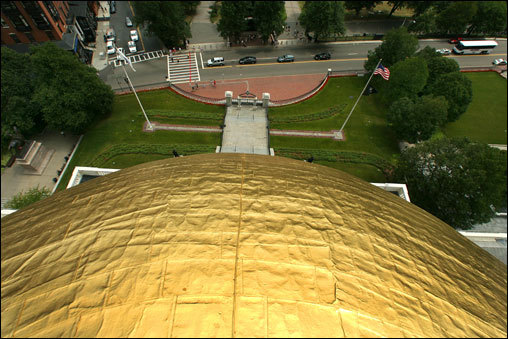Online maps take a new direction
By Scott Kirsner | August 5, 2007
In the manner of the great cartographers Gerardus Mercator, Abraham
restaurants in my neighborhood have high chairs," says Povo cofounder Max Metral. "So I might go on Povo to find those, but I might also tag other restaurants that I know have high chairs."
Sitting in the 1369 Coffeehouse in Cambridge's Central Square, cofounder Hasty Granbery demonstrates how easy it is to add an entry to Povo that lets users know there is an hourly charge for using the cafe's wireless network. Metral pulls out an Apple iPhone, and shows off a version of the site specially designed for the device.
Povo will succeed or fail based on whether users discover the site, like it, and are willing to contribute to it over time. The potential is intriguing: Neighborhood historians could "tag" landmark buildings with links, photos, and information about their history, and crime-watchers could indicate an alley where car smash-and-grabs regularly take place.
EveryScape, the company using camera-equipped cars to photograph cities, also has an element of user participation with the potential to make the site a major destination. EveryScape wants to make it easy for anyone to upload panoramic photographs and have them added to the company's three-dimensional maps. "We're trying to allow the world to help us build the world," says chief executive Jim Schoonmaker, alluding to the company's ambitious vision. For more prolific and experienced photographers, the company is dangling the incentive of cash payments.
When EveryScape was founded in 2002 -- and called Mok3 -- it was a cool technology in search of a market. Cofounder Byong Mok Oh developed software at the Massachusetts Institute of Technology that could examine photographs and make assumptions about the geometry of the objects in them, transforming the pictures into three-dimensional environments. The original plan was to sell the software to video game designers and architects to help them speed up the process of creating digital environments and also create virtual tours for luxury properties like The Breakers in Palm Beach.
But in 2005, investors lost patience with that strategy. "We had all this great technology that we knew had promise," explains Ham Lord, managing director of Launchpad Venture Group, one of EveryScape's backers. "We saw that it was going to take more money to build a high-quality, shrink-wrapped software product, and we felt like the biggest opportunities tended to be Web-based. We weren't afraid of going after that." The investors agreed to put in more money (EveryScape has raised about $5 million so far), and replaced cofounder and chief executive Yonald Chery with Schoonmaker.
EveryScape decided to start mapping cities, beginning with San Francisco and Boston, and build an advertising model atop the maps. Though Schoonmaker is a bit coy about the specifics, a business like a furniture store will be able to pay EveryScape to have its interior added to the map, or for advertising on the site that will help users find it in the real world. (Unlike Povo, users won't be able to add information to interiors that have been underwritten by companies -- so there'll be no digital graffiti about the tacky couch or cheap-looking rug.)
EveryScape believed there was the potential to forge a partnership with Google, and met with representatives of the search giant's mapping team late last year at a conference. Schoonmaker demonstrated the new stuff the company was working on, and showed how it integrated with Google Maps, but Google didn't say much about its future plans.
Google's reaction to EveryScape's demo, recalls venture capitalist Scott Johnson, was that they didn't want to show favoritism to EveryScape over other companies. "They said, 'Gee, this is great, but it's our policy that we want the world to think of things like this. We don't want to compete; we want to enable,' " Johnson says. (A Google representative didn't respond to requests for comment.) But this year, EveryScape started to hear rumors that Google was going to integrate street-level photographs into Google Maps. "We started preparing for a surprise launch by Google," says Johnson, managing director of DFJ New England and an investor in EveryScape. The company learned Google was planning its launch for the Where 2.0 conference in May, and quickly hired a public relations firm and prepared a preview version of its site.
That hustle helped the company earn some ink when the media wrote about Google's new Street View feature. Google had partnered with a Toronto company, Immersive Media, to take photos of five US cities from a car. (EveryScape's photos seem to be crisper, and Street View doesn't allow users to enter buildings -- yet.)
Competing with big players like Google and Microsoft can be nerve-racking. They might become allies, or they might decide they need to buy a company to aid their competition with a rival. Or they might assign 100 people to do exactly what a small company is doing with 25 people, just four times faster.
While building another company, Firefly Network, Max Metral was quoted on what it was like to compete with Microsoft. "If you find something that can make you ridiculously rich, then that's something Microsoft is going to want to take from you," Metral told The New York Times Magazine. "All we can do is meet with them and try to see what they're going to do to us when they feel like doing it." (Microsoft apparently took Metral's quote as a compliment, eventually buying Cambridge-based Firefly in 1998 for an estimated $40 million.)
But if competing with monoliths is too scary, then you're probably not an entrepreneur. Because entrepreneurs are not deterred by the text that warns, "Here be dragons," and they're willing to start sailing toward the edge of the world to find out what's there.



